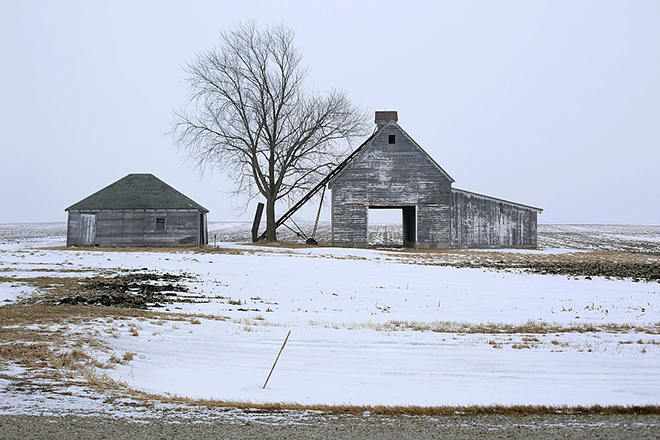S&P Global Offerings
Featured Topics
Featured Products
Events
S&P Global Offerings
Featured Topics
Featured Products
Events
S&P Global Offerings
Featured Topics
Featured Products
Events
Banking & Capital Markets
Economy & Finance
Energy Transition & Sustainability
Technology & Innovation
Podcasts & Newsletters
Banking & Capital Markets
Economy & Finance
Energy Transition & Sustainability
Technology & Innovation
Podcasts & Newsletters
S&P Global Offerings
Featured Topics
Featured Products
Events
16 Nov, 2022
By Siri Hedreen

| A barn stands alongside U.S. Highway 65 in Story County, Iowa. The county is being challenged in court by a carbon capture and storage developer. |
Summit Carbon Solutions LLC is challenging its Iowa home county in court for imposing regulations on carbon dioxide pipelines, the latest development in a clash between landowners and a trio of carbon capture and storage developers in the U.S. Midwest.
Summit, based in Ames, Iowa, plans to build an interstate pipeline network to transport CO2 emissions from ethanol plants to an underground storage site in North Dakota, where the gas will be permanently sequestered. But the project faces opposition from some landowners concerned about pipeline safety and environmentalists critical of carbon capture.
On Nov. 14, Summit and fellow plaintiff William Couser filed a lawsuit against the Story County, Iowa, Board of Supervisors, alleging the county's recent ordinance on the siting of hazardous materials pipelines is preempted by state and federal law. The complaint was filed in the U.S. District Court for the Southern District of Iowa.
Another Iowa county along Summit's proposed route, Shelby County, adopted a similar ordinance earlier in November and was served a lawsuit on Nov. 15.
Couser owns a 5,200-head feedlot along the proposed pipeline route as well as farms that supply corn to Lincolnway Energy LLC, an ethanol plant in Story County. Couser is also co-owner of the ethanol plant, which plans to use Summit's pipeline to offload its CO2 emissions.
Carbon capture projects unfold across the Midwest
Carbon capture is a tool for lowering the carbon footprint of emissions sources, such as refineries or power plants. The U.S. federal government subsidizes the technology with tax credits, newly expanded by the Inflation Reduction Act, that pay emitters up to $85 for every tonne of CO2 captured and stored.
Three Midwest developers — Summit, Navigator CO2 Ventures and Wolf Carbon Solutions US LLC — aim to support carbon capture deployment by building pipelines connecting CO2 emitters to underground storage sites. The combined infrastructure projects span North Dakota, South Dakota, Nebraska, Minnesota, Iowa and Illinois.
According to August filings with the Iowa Utilities Board, the developer is also seeking the power of eminent domain in six Iowa counties. Summit announced Nov. 8 that it had secured easement agreements covering about 1,030 miles of the developer's planned pipeline route, more than half of the total project footprint, and paid $200 million in easement payments to landowners.
While some locals are protesting the project, including in radio ad campaigns, others are attempting to place new restrictions on CO2 infrastructure. In October, Story County passed an ordinance establishing setback requirements for hazardous materials pipelines, including CO2 pipelines, to protect residents in case of a rupture.
But according to Summit, such regulations already fall under the authority of the U.S. Department of Transportation's pipeline agency, the Pipeline and Hazardous Materials Safety Administration. The Story County ordinance "purports to regulate within a field so pervasively occupied by federal law that any state or local regulation is precluded and excluded," Summit said in the suit.
Story County has not yet filed a response to the lawsuit. The county's attorney did not immediately respond to a request for comment on Nov. 16.
S&P Global Commodity Insights produces content for distribution on S&P Capital IQ Pro.
